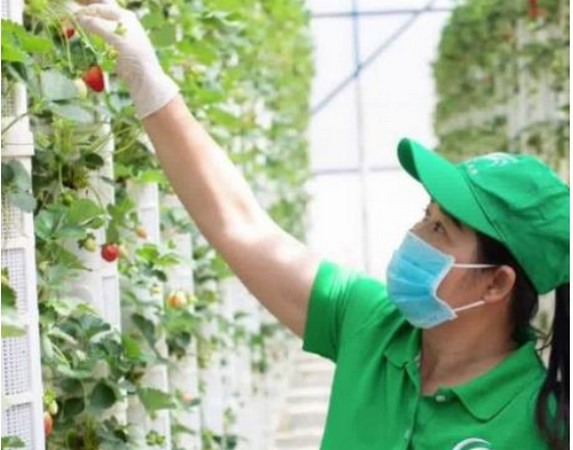At a farm in Da Lat, Vietnam, a woman gently picks plump red strawberries from rows of carefully staked, vertical farming pods. Designed by Australian agribusiness, Orlar, using innovation and technology, the vertical farms emit zero greenhouse gases, are 100 percent water-efficient, and use significantly less energy than traditional hydroponics. They use an organic Australian rock to grow strawberries and other pollutant-free fruit and vegetables destined for Vietnam’s grocers and premium restaurants.
This story is just one example of the way agricultural technology or AgTech is poised to reshape Vietnam’s agricultural sector, creating exciting commercial opportunities for Australian agricultural innovators that can do their research, adapt and invest in cultivating local relationships.

It features a case study in Accelerating AgTech: Australia’s opportunity in Vietnam, launched today by Asialink Business and Beanstalk AgTech. This timely report analyses the latest trends and identifies opportunities for Australian and Vietnamese AgTech innovators to share expertise, tackle common challenges, and boost quality, sustainability, and productivity.
“Vietnam’s agriculture sector is rapidly transforming and poised for further growth. Agriculture already employs 1 in 3 people in Vietnam, generating over $56 billion per year in exports like rice, coffee, and seafood,” says Robert Law, Director of Advisory and Insights at Asialink Business. “But the sector also faces many shared challenges with Australia, such as balancing costs and output with environmental impacts. In both countries, ‘smart agriculture’ technologies can offer alternatives to traditional labor and water-intensive production methods. With a strong track record of collaboration already in place, Australia and Vietnam are natural partners to share expertise and boost AgTech opportunities,” Law says.
Remaining competitive
The study finds that to remain competitive, Vietnam’s agriculture sector needs to invest in more efficient, high-quality, and sustainable production. With agriculture already a cornerstone of the Australia-Vietnam relationship, the study highlights the solid foundations for collaboration to drive innovation, address shared challenges, support rural economies and enhance competitiveness.
“The Australian AgTech industry has come into its own in recent years and is starting to make waves on the global stage. Through our own efforts working alongside many of Vietnam’s agrifood industry leaders, what we see is a market that is hungry for transformative solutions. Australia and Vietnam have built a strong foundation for innovation-centered collaboration based on shared values, common challenges, and complementary capabilities. With the right blend of focus, support, and adaptability, Vietnam should represent an attractive growth opportunity for Australia’s AgTech innovators,” says Justin Ahmed, a Director at Beanstalk and Global Program Lead for GRAFT Challenge Vietnam 2021.
Key challenges
The report identifies 4 key areas where Australian innovators can adapt AgTech solutions to the challenges facing Vietnam’s agriculture sector:
1. Sustainability: Demand will grow in Vietnam for technology innovations to minimize waste and mitigate environmental impacts, such as sensors coupled with data analytics that can help decision-making,
2. Climate resilience: Both countries are grappling with the impacts of climate change, creating opportunities in areas such as water management and weather-related risk assessment.
3. Productivity: As Vietnam is export-oriented, there are opportunities for technologies that will boost productivity and drive competitiveness in the face of seasonal variations, such as robotics, automation, and drones.
4. Food quality and safety: Growing concern among Vietnamese consumers about food safety is creating opportunities in blockchain, QR codes, DNA tracing, and automated reporting for certification, bringing greater visibility through the food supply chains.
Funded by the Department of Foreign Affairs and Trade’s Australia-Vietnam Enhanced Economic Engagement Grant pilot, the report sets out a practical roadmap to help position Australian AgTech businesses for success in Vietnam. “We have a window of opportunity, but Australian businesses will need to invest time and resources to develop better market understanding and practices. They will need to adapt to local requirements, identify appropriate entry points, and engage partners who can support them in-market,” Law says.
The time to act is now: If both Governments and the private sector act quickly, they can capitalize on pressing opportunities, accelerate growth and realize the potential of Australia and Vietnam’s AgTech sectors.
Download the report here.
For more information:
Asialink Business
Heather Chai, Head of Communications & PR
Mob: +61 423 035 277
[email protected]
www.asialinkbusiness.com.au
Beanstalk AgTech
William Taing, Director
Mob: +61 404 459 018
[email protected]
www.beanstalkagtech.com
